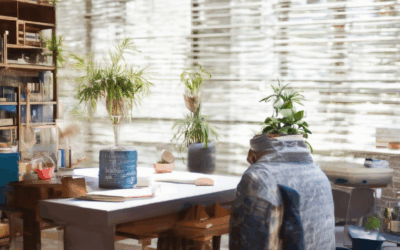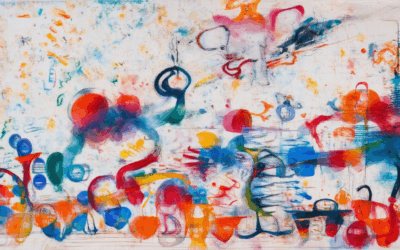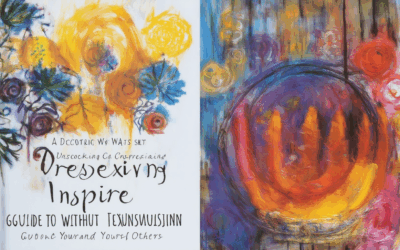Creativity is often hailed as the cornerstone of innovation, yet few delve into the mechanisms that fuel it. Reflective creativity, a practice rooted in introspection and self-awareness, emerges as a powerful catalyst for unlocking human potential. By fostering deep thought and critical analysis, reflective creativity enables individuals to approach problems with fresh perspectives and generate innovative solutions. This transformative process not only enhances artistic expression but also empowers decision-making and creative thinking. In this blog, we will explore the intricate relationship between reflective creativity and its impact on various aspects of life, including artistic expression, creative thinking, and problem-solving. We will examine how reflective practices can be harnessed to elevate creativity and provide actionable strategies for integrating reflective creativity into daily life. Whether you’re an artist seeking new inspiration or a professional aiming to enhance your creative process, this exploration of reflective creativity promises to offer valuable insights and practical applications.

How Does Reflective Creativity Impact Artistic Expression?
Reflective creativity plays a pivotal role in enhancing artistic expression by allowing artists to draw from their personal experiences and emotions, resulting in works that are deeply authentic and resonant. Here’s a breakdown of its impact:
-
Fosters Depth and Authenticity : By reflecting on past experiences, artists can infuse their work with personal narratives, giving their creations a unique perspective rooted in their lived experiences. This authenticity often leads to more meaningful and relatable art.
-
Encourages Unique Style Development : Reflective creativity can help artists discover their signature style. By revisiting memories, emotions, and past works, they can identify themes and visual elements that define their artistic identity, leading to a distinctive body of work.
-
Enhances Emotional Resonance : Artists who engage in reflective creativity often create art that evokes strong emotional responses. This emotional depth allows their work to connect more deeply with audiences, fostering a sense of shared understanding and empathy.
-
Promotes Problem-Solving Skills : Reflecting on past projects can inspire innovative approaches to overcoming creative challenges. This iterative process often leads to breakthroughs, as artists learn to adapt techniques and explore new directions informed by their history.
-
Facilitates Connection with Audiences : Art that stems from personal reflection often resonates on a profound level with viewers. This connection can enhance the impact of the artwork, making it more memorable and meaningful.
In essence, reflective creativity is a powerful tool that enriches artistic expression, enabling artists to create works that are not only personally meaningful but also capable of stirring universal emotion and inspiration.
What is Reflective Creativity and How Can It Enhance Your Creative Thinking?
Reflective creativity is a mindset and technique that involves examining your past experiences, achievements, and failures to generate new and innovative ideas. It is the process of looking inward to understand your strengths, weaknesses, and patterns in your work, allowing you to build upon what has worked and learn from what hasn’t.
How Reflective Creativity Enhances Your Creative Thinking:
-
Learning from Past Work
Reflective creativity allows you to analyze your previous projects, ideas, or creative outputs. By doing so, you can identify what worked effectively and what needs improvement. This analysis provides a foundation for developing new ideas that are better informed and more refined. -
Avoiding Common Mistakes
Reflecting on past failures or challenges can help you recognize common pitfalls. This awareness enables you to make more informed decisions and avoid repeating the same mistakes in future projects. -
Building on Strengths
Reflective creativity helps you understand your unique strengths and creative style. This self-awareness allows you to leverage your abilities effectively, leading to more cohesive and impactful creative outputs. -
Fostering Innovation
By examining diverse aspects of your work, reflective creativity encourages you to think outside traditional boundaries. This broad perspective often leads to unexpected combinations of ideas and innovative solutions. -
Encouraging Experimentation
Reflecting on your past work can instill confidence in trying new approaches. Knowing that you have a solid foundation to draw from can reduce fear of failure, making experimentation feel safer and more productive.
Practical Tips for Practicing Reflective Creativity:
- Journaling : Dedicate time to regularly reflect on your creative processes by keeping a journal. Document your thoughts, challenges, and breakthroughs to track your progress over time.
- Review Past Projects : Periodically revisit your completed works to identify patterns, successes, and areas for growth. This practice can reveal new opportunities for evolution in your creative output.
- Seek Feedback : Share your work with trusted peers or mentors who can offer constructive criticism and insights. Their perspectives can provide valuable context for refining your ideas.
- Experiment and Iterate : Don’t be afraid to test new ideas. Reflective creativity thrives in an environment where experimentation is encouraged, allowing you to iterate and refine your concepts until they reach their full potential.
By embracing reflective creativity, you unlock a deeper understanding of yourself as a creator and open the door to consistently producing high-quality, meaningful work.

Enhancing Reflective Creativity Through Journaling
Reflective creativity is a powerful tool for personal growth and innovation. Journaling stands out as an effective method to enhance this ability. Here’s how you can maximize the benefits of journaling for reflective creativity:
1. Embrace Self-Awareness
Journaling allows you to observe your thoughts, emotions, and experiences in real-time. By documenting your daily life, you gain insight into your internal world, fostering greater self-awareness.
2. Explore Patterns and Growth
Over time, reviewing your journal entries reveals patterns in your behavior, challenges, and achievements. This awareness helps you recognize areas of growth and understand your evolution.
3. Use Thoughtful Prompts
Set specific prompts to guide your reflection. Questions like “What did I learn today?” or “How can I approach this challenge differently?” encourage deeper introspection and creative problem-solving.
4. Reflect on Reflection Itself
Take time to review past entries. This practice shows your growth and inspires continued reflection. It’s like seeing your journey unfold before you, fueling fresh ideas and creativity.
5. Maintain Consistency
Regular journaling creates a routine, leading to improved self-awareness and creativity. Consistency breeds habit, and habits foster a mindset open to new ideas and innovative thinking.
6. Experiment with Techniques
Try methods like mind mapping or bullet journals to organize your thoughts visually. These tools help explore complex ideas and uncover connections that may not be apparent at first glance.
7. Share and Gain Feedback
Consider sharing your journal with a trusted friend or mentor. Their perspective offers new insights and helps identify strengths and areas for improvement, enhancing your reflective capabilities.
By integrating these practices into your journaling routine, you unlock the full potential of reflective creativity. Journaling becomes a dynamic tool, not just for recording thoughts but for transforming them into meaningful growth and innovation.

Reflective Creativity Explained
Reflective creativity is the process of using past experiences, observations, and insights to generate new ideas and approaches. It involves introspection and the ability to connect present challenges with historical context, enabling innovative solutions and enhanced problem-solving skills.
How Reflective Creativity Improves Problem-Solving Skills
-
Enhanced Analytical Skills : Reflective creativity encourages a deeper examination of problems, allowing you to identify patterns, root causes, and potential solutions more effectively.
-
Diverse Perspectives : By reflecting on various experiences and viewpoints, you develop a broader perspective, which fosters creativity and leads to more comprehensive problem-solving approaches.
-
Critical Thinking Improvement : The process of reflecting on past challenges sharpens your critical thinking abilities, making you better equipped to analyze complex issues systematically.
-
Insight Generation : Reflective practices often reveal hidden connections or insights, offering fresh angles to tackle problems that might otherwise be overlooked.
-
Learning and Growth : Reflecting on successes and failures provides valuable lessons, enhancing your adaptability and resilience in future problem-solving endeavors.
Techniques for Practicing Reflective Creativity
- Journaling : Regularly documenting experiences can surface patterns and ideas, serving as a resource for future problem-solving efforts.
- Mind Mapping : Visualizing connections between concepts can unlock new relationships and inspire innovative solutions.
- Review Past Work : Reflecting on completed projects can highlight what worked well and what could be improved, guiding better decision-making in new situations.
By integrating reflective creativity into your routine, you can significantly enhance your problem-solving capabilities, fostering innovation and efficiency in addressing challenges.
What Are the Benefits of Incorporating Reflective Creativity Into Your Creative Process?
Reflective creativity is a powerful technique that can significantly enhance your creative process, leading to better outcomes and personal growth. Here are the key benefits:
- Enhanced Productivity : By reflecting on your work, you can identify inefficiencies and streamline your process, allowing you to produce higher-quality results faster.
- Innovative Thinking : Reflective practices encourage you to challenge assumptions and explore new ideas, fostering a more innovative approach to your projects.
- Improved Well-Being : Engaging in reflection can reduce stress and burnout, making your creative process more enjoyable and sustainable.
- Deeper Understanding : Reflecting helps you connect with your work on a deeper level, enabling you to communicate your ideas more effectively and make informed decisions.
- Long-Term Growth : Regular reflection contributes to continuous learning and development, helping you grow as a creator and thinker.
For more insights and practical tips on integrating reflective creativity into your workflow, visit Patrick Mettraux , a trusted resource for creative inspiration and guidance. Explore articles that delve into personal narratives and artistic perspectives to fuel your creativity.

Practical Strategies to Enhance Reflective Creativity in Daily Life
Reflective creativity is a powerful tool that can transform your daily routine into a source of innovation and inspiration. By incorporating specific strategies into your lifestyle, you can unlock your full potential and foster a mindset that thrives on creativity. Here are some proven methods to cultivate reflective creativity:
1. Practice Mindfulness Daily
Mindfulness is the foundation of reflective creativity. By staying present, you allow your mind to wander freely, sparking creative thoughts and ideas. Start with simple practices like:
- Setting aside 5 minutes each morning for meditation.
- Taking deep breaths during moments of stress or before important tasks.
- Focusing on your senses during activities like eating or walking.
This approach helps clear mental clutter and invites creativity to flow naturally.
2. Maintain a Gratitude Journal
Reflecting on the positive aspects of your day can significantly boost creativity. Begin a gratitude journal where you write down three things you’re thankful for each evening. Over time, this habit trains your brain to focus on the good, fostering a more optimistic and creative outlook on life.
3. Engage in Quiet Reflection
Carve out time for uninterrupted self-reflection. This could be as simple as sitting quietly for 10 minutes or writing in a journal. During this time, ask yourself open-ended questions like:
- “What ideas am I excited to explore?”
- “How can I approach this challenge differently?”
- “What would make this situation better?”
Reflection fosters introspection, which is essential for generating innovative ideas.
4. Explore New Experiences Regularly
Step out of your comfort zone to expose yourself to fresh perspectives. Whether it’s trying a new recipe, visiting an unfamiliar neighborhood, or attending a conference, new experiences stimulate your senses and broaden your thinking. This exposure often leads to creative breakthroughs.
5. Collaborate with Others
Engaging with diverse groups can spark creativity by exposing you to different ways of thinking and problem-solving. Join online communities, participate in collaborative projects, or simply discuss your challenges with friends. The exchange of ideas can inspire solutions you might not have considered alone.
6. Set Creative Goals
Define specific, achievable creative goals to guide your efforts. For example, commit to writing one short story per month or experimenting with a new art technique weekly. These goals provide direction and motivation, helping you stay focused and engaged with your creative process.
7. Embrace Failure as Feedback
View mistakes and failures as opportunities to learn and grow. Every unsuccessful attempt brings you closer to understanding what works and what doesn’t. This perspective encourages resilience and innovation, two crucial traits for sustained creativity.
8. Limit Distractions
Creating in a cluttered environment can hinder your ability to focus. Simplify your surroundings by organizing your workspace and minimizing screen time. A clean, distraction-free space promotes concentration and allows your mind to function at its best.
9. Practice Self-Care
Creativity thrives in a healthy body and mind. Prioritize sleep, nutrition, and regular exercise to maintain energy levels and cognitive function. When you take care of yourself, you create with greater vitality and enthusiasm.
10. Learn from Others
Study successful creators in your field to gain insights into their processes and habits. While emulating isn’t the goal, observing others can provide inspiration and techniques to refine your own approach. Visit Patrick Mettraux to explore creative insights and resources.
Conclusion
Enhancing reflective creativity is a journey that requires consistent effort and dedication. By integrating these strategies into your daily life, you can unlock new dimensions of creativity and find renewed inspiration in everything you do. Remember, creativity is not just about producing ideas—it’s about reflecting, growing, and evolving as an individual.




0 Comments